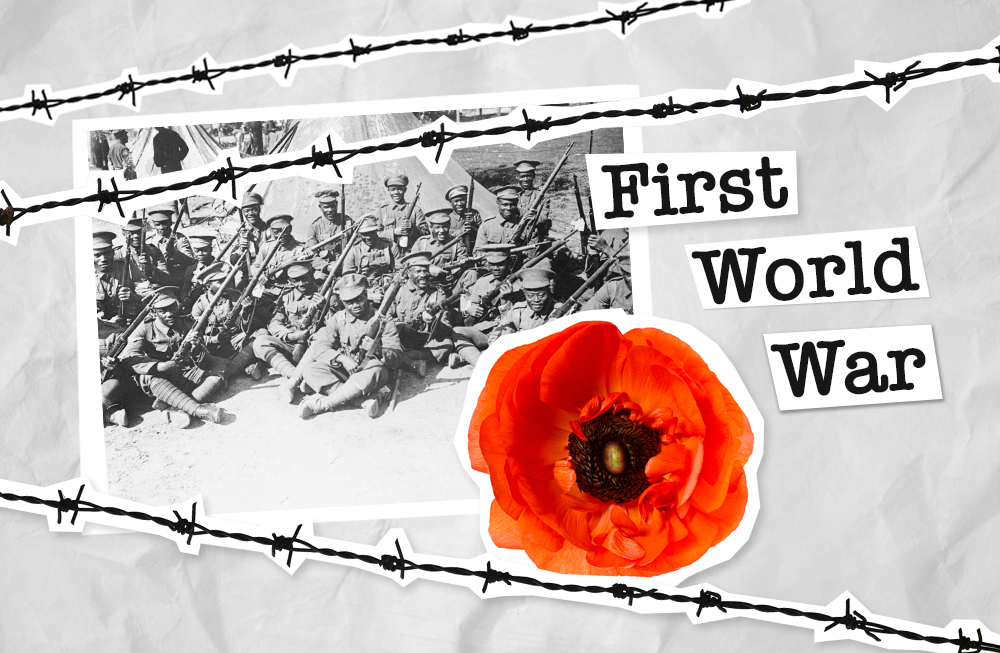Teaching children about the First World War
What happens within the project
In our project Fallen Fields, children will start by listening to an audio recording of a soldier leaving for war. Using inspiring illustrations, they’ll write diary entries from the perspectives of characters affected by the war. They will delve into the causes of the First World War and produce a newspaper report. Their research skills will help them to find out which countries were the Central Powers, which were the Allied Powers and which were neutral. They will order significant events and decide who were the most influential figures of the First World War. After researching devastating battles, they’ll write short stories from the viewpoints of British soldiers. They will read wartime poetry and examine artwork to pick out evocative imagery and thought-provoking themes. They will also analyse wartime propaganda and reflect on the significance of poppies.
Before getting started
My first step, even before starting the project, would be to send the knowledge organiser home with the children and encourage them to read it thoroughly. Doing this will give everybody a shared starting point, and provide a stimulus for discussions around what else they would like to find out. I’d also use the display materials provided to create a focal point for the new topic and ask children to add artefacts, books and photographs during the project that they may be able to collect from friends and family.
Memorable Experience
The Memorable Experience in this project does not require you to make any special arrangements and is easy to set up in your classroom. An audio recording gives the children a first-hand account of a young man’s thoughts as he gets ready to leave home for the Western Front and leads into a thoughtful literacy lesson that contrasts his perspective of war with his mother’s. Children study the mother’s diary entry and listen to an audio recording of the text to make their comparisons.
When using the audio resources, keep distractions to a minimum by drawing the blinds and allowing children to close their eyes, drinking in the atmospheric quality of the resources.
Engage stage
The Engage stage introduces children to essential background knowledge about the war. They discover the complexity and causes of conflict and find out about the significant people, alliances and events that shaped the war. With all the resources provided, the Engage stage makes this challenging topic accessible to all children and saves you time in finding the right information. A good idea is to give the children a ‘diary’ to record their daily reflections and learning about the topic. Encouraging children to keep a diary will also link well to the diary extract studied at the start of the project.
Develop stage
As we go into the second week of the project, children explore aspects of war more deeply. Depending on how you tailor your planning, children can learn about war poetry, significant battles, weaponry, wartime art and music and take an in-depth look at notable events such as the unofficial Christmas truce of 1914 and the use of wartime propaganda. Cross-project themes such as hope, bravery, loss, remembrance, respect, and love are important to highlight throughout the project. There are also some brilliant texts to read alongside the delivery of this project, either for whole-class reading or individual reading for pleasure. My favourites include Tom Palmer’s Armistice Runner and Michael Morpurgo’s War Horse.
Innovate stage
At the Innovate stage, children are asked to explore the importance of the Armistice and remembrance. If you feel it’s appropriate, you can add a fundraising dimension to the challenge, but the inclusion of a blank Innovate board in the resource pack means you can tailor the activity to your class.
Express stage
The Express stage requires children to reflect on the consequences of war. Activities explore the legacy of those who made great sacrifices, including John Bert Morris, a 19-year-old soldier. The resource showing his death notification is particularly poignant, especially as this resource is about a relation of the team at Cornerstones. The audio recording of For the Fallen by Laurence Binyon is a brilliant resource for a final assembly.
To conclude the project, I would use the quiz provided as an engaging way to find out about children’s retained knowledge. Study of the First World War is not a statutory part of the national curriculum but can fit within the requirement to study significant events in Britain beyond 1066. However, even without this link to the national curriculum, there’s so much value in children learning about this war and how it shaped our nation. My advice would be to take a look. It’s more than worth the curriculum time.


